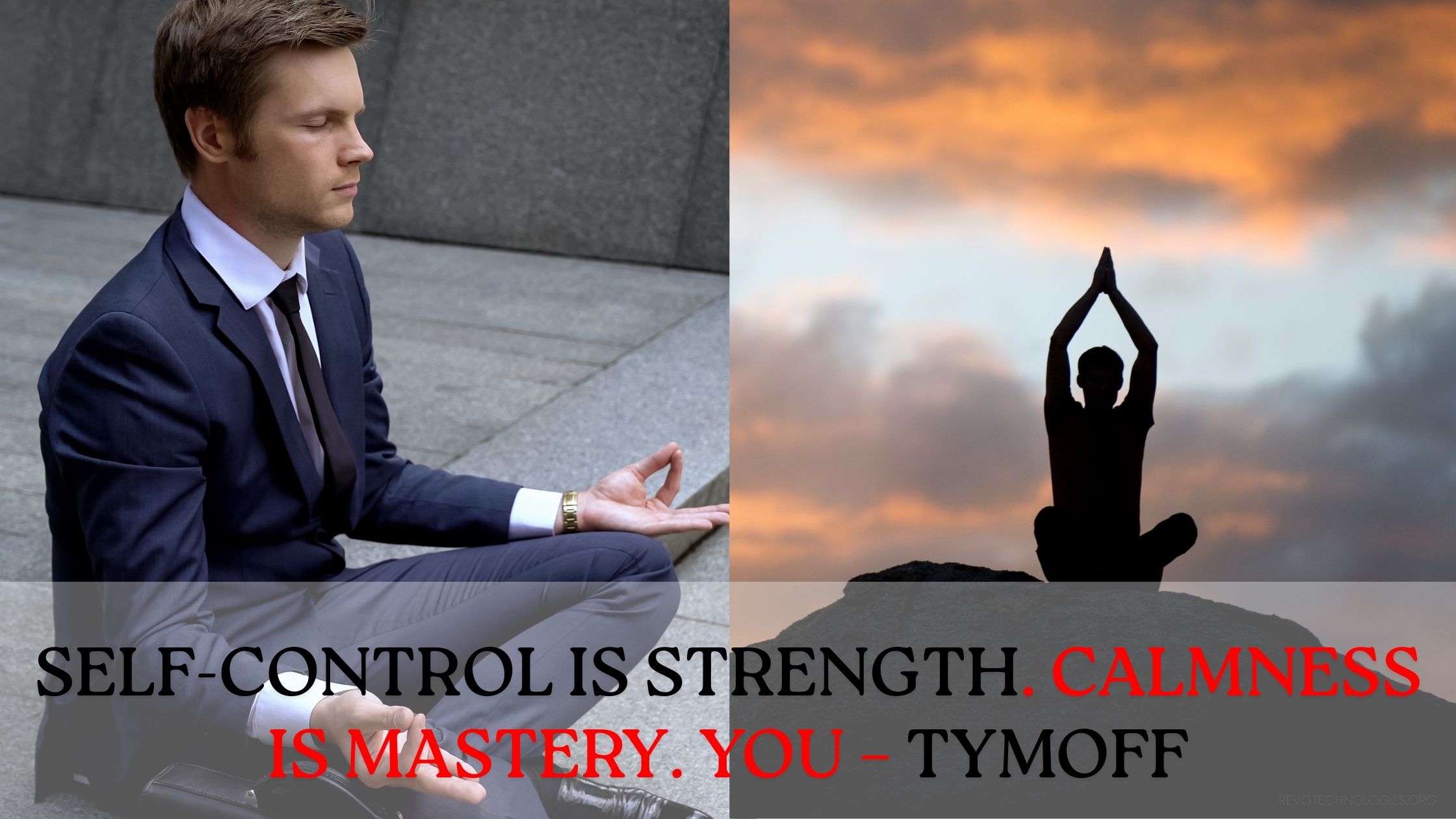Emotions can be like uninvited guests in life. They often appear when we least expect them, pulling us away from our goals or draining us. If we could build an inner strength so strong, it could ground us even in the wildest storms, what would we do?
“Self-control is strength. Calmness is mastery. You – Tymoff.” summarizes this idea of inner strength, rooted in self-control and calmness.
This phrase might seem simple, but it contains a profound philosophy. Here’s how mastering self-control and calmness can help us live a more peaceful, goal-oriented, and fulfilling life.
What Does It Mean to Have Self-Control?

Self-control is the ability to guide your actions, emotions, and thoughts even when external influences or internal impulses try to sway you. Without it, you’d just go wherever the wind blows. You steer towards your chosen destination with self-control.
The Power of Self-Control: Why It Matters
There is more to self-control than just saying “no” to temptations. Keeping your life aligned with what matters most is what it’s all about. Self-control makes us stronger in the following ways:
- Staying Focused on Goals: Achieving long-term goals requires self-control. Self-control helps us focus on the prize, regardless of short-term distractions, while studying for exams, pursuing a career, or staying fit.
- Making Thoughtful Decisions: It is often regrettable to make decisions in the heat of the moment. By exercising self-control, we can pause, reflect, and make choices based on our values and goals, not just on our immediate feelings.
- Improved Relationships: The ability to control one’s emotions fosters patience and thoughtfulness, which can improve communication and strengthen bonds with others. In challenging situations, it helps us respond rather than react.
- Boosted Mental Health: Self-control leads to a calmer, more resilient mindset by reducing impulsive actions. In addition to less impulsivity, less regret often leads to more emotional stability as well.
- Resilience During Adversity: As life throws challenges our way, self-control allows us to stay focused and grounded. As a result, we are able to persevere without being overwhelmed by the chaos around us.
How to Strengthen Self-Control

Self-control doesn’t develop overnight. These are some practical ways to strengthen this essential quality:
1. Set Clear, Meaningful Goals
We are more likely to resist distractions when we have meaningful goals. Think about what you want to accomplish, and remind yourself why it matters. You will be able to stay focused when faced with temptation this way.
2. Practice Mindfulness
Practicing mindfulness helps us become aware of our thoughts and emotions without reacting impulsively. Making thoughtful choices can be aided by simple practices like deep breathing and observing your thoughts.
3. Avoid Triggers
Avoid or limit situations or people that make exercising self-control difficult. If you’re working on a task and your phone distracts you, place it out of sight until you’re finished.
4. Build Healthy Habits
Good habits make self-control easier. Whether it’s a regular exercise routine, healthy eating, or a consistent sleep schedule, these habits help you maintain self-control.
5. Take Small Steps
Having self-control doesn’t require grand gestures. Say “no” to a small temptation, and gradually work your way up. You become better at managing larger challenges when you accumulate these small acts of control over time.
Calmness as Mastery: Why It’s Vital
Calmness is the mastery that keeps us steady, regardless of the weather, where self-control is the strength that steers us in the right direction. Our inner state of calm allows us to think clearly, make wise decisions, and remain unshaken by life’s ups and downs.
Benefits of Calmness
- Clearer Thinking: Our minds are free to think clearly when we are calm. When we’re able to evaluate situations, solve problems, and make rational decisions, we’re more likely to succeed.
- Enhanced Relationships: Being calm makes us better listeners, more patient partners, and more empathetic friends. We can interact without being clouded by anxiety or anger.
- Stress Reduction: Calmness can reduce the stress response in our body, which can lead to improved mental health and lower blood pressure.
- Improved Focus: When the mind is calm, it’s easier to focus on one task at a time, making it easier to complete important projects without feeling overwhelmed.
- Strengthened Emotional Stability: We are less likely to be swept away by anger, sadness, or fear when we are calm. As a result, it is easier for you to face challenges and bounce back from setbacks when you are emotionally stable.
Techniques to Cultivate Calmness
It is possible to cultivate calmness through consistent practice in the same way as self-control:
1. Meditation and Breathing Exercises
Meditation and deep breathing are powerful tools for calming the mind. Taking a few minutes to focus on your breath can reduce stress levels and bring clarity to your mind.
2. Practice Gratitude
It’s easier to remain calm when you think about what you’re grateful for. By practicing gratitude daily, you can shift your mindset and build emotional resilience.
3. Create a Peaceful Environment
We are influenced by our surroundings. Organize your living space and remove any unnecessary clutter. Creating a peaceful environment can help cultivate a peaceful mind.
4. Disconnect Regularly
The use of digital devices and social media can contribute to stress and anxiety. You can recharge your mental and emotional batteries by spending time in nature and taking breaks from screens.
5. Self-Care and Routine
Maintaining calmness can be achieved through regular self-care, such as reading a book, taking a walk, or engaging in a hobby. Having a routine gives us a sense of control and structure, both of which support calm.
Self-Control and Calmness: A Dynamic Duo
As self-control helps us say “no” to distractions, calmness helps us maintain a stable and focused mindset. Synergy is created when they work together:
- Balanced Response to Challenges: You can handle difficult situations without becoming reactive or overwhelmed when you combine self-control and calmness.
- Enhanced Problem Solving: Self-control keeps you focused while calmness provides clarity. Problem-solving becomes more thoughtful and effective when these two factors are combined.
- Greater Life Satisfaction: Having self-control and calmness allows us to live in alignment with our values, avoid unnecessary stress, and focus on what really matters.
Benefits of Self-Control and Calmness
| Aspect | Self-Control | Calmness |
| Mental Clarity | Helps resist impulsive actions | Provides clear thinking in situations |
| Stress Management | Reduces anxiety from poor decisions | Lowers stress and enhances stability |
| Relationship Health | Improves patience, thoughtful response | Encourages empathy and understanding |
| Goal Achievement | Keeps focus on long-term goals | Prevents distractions from stressors |
| Emotional Stability | Controls immediate emotional reactions | Maintains a balanced, calm demeanor |
Why “Self-Control is Strength. Calmness is Mastery. You” Matters
This phrase calls us to live consciously and purposefully. We cultivate an inner foundation that supports us through life’s challenges, challenges, and surprises when we ground ourselves in self-control and calmness. With confidence, resilience, and peace, we can face whatever comes our way instead of being tossed around by circumstances.
By learning to live by the principles of self-control and calmness, we begin to understand our inner strength. The more we practice these skills, the closer we get to mastery, resilience, and peace.
“Self-control is strength. Calmness is mastery.” – Tymoff. These words remind us that life requires both a strong will and a calm mind.
When we cultivate these qualities within ourselves, we not only become stronger but also find true peace. That, perhaps, is the greatest achievement we can achieve in life.
Frequently Asked Questions
What can self-control do to improve physical health and wellbeing?
Having self-control is critical to physical health because it allows people to make healthier choices, such as eating a balanced diet, exercising regularly, and sleeping well. With strong self-control, a person can resist unhealthy cravings, avoid procrastination, and maintain consistent routines that lead to better physical and mental health. Stress can also be reduced, energy levels can be enhanced, and long-term vitality can be supported by developing self-control for wellness.
Is it possible to reduce anxiety or chronic stress by practicing calmness?
It is true that practicing calmness can significantly reduce anxiety and chronic stress. In addition to bringing down cortisol levels and easing muscle tension, deep breathing, meditation, and mindfulness help slow down the body’s stress response. The practice of calmness builds resilience to daily stressors, enabling individuals to approach stressful situations with clarity and control instead of feeling overwhelmed. In addition to improving emotional regulation, calmness mastery reduces anxiety symptoms.
What are the benefits of self-control in professional life and career advancement?
Self-control enhances productivity and career growth in professional settings by improving focus, discipline, and time management. High self-control employees are better at managing deadlines, resisting distractions, and avoiding burnout. In addition, self-control fosters patience and thoughtfulness, which allows individuals to handle conflicts more effectively. In leadership roles, this skill contributes to sound decision-making, strategic planning, and a balanced approach to challenges.
In high-pressure or chaotic situations, how can we practice calmness?
Practicing calm in high-pressure environments can be as simple as breathing deeply and slowly, which reduces heart rate and calms the mind. Other methods include mentally stepping back from the situation, visualizing a peaceful scene, or taking a short walk. Mindfulness techniques, such as grounding exercises or counting to ten before responding, can also be beneficial. Through these practices, the mind is trained to maintain calmness in chaotic situations, improving overall stress management.
Can self-control and calmness be strengthened by certain daily habits?
Meditation, journaling, regular exercise, and practicing gratitude strengthen both self-control and calmness. Meditation improves focus and helps manage emotions, which contributes to self-control. Keeping a journal can help you process emotions, fostering calmness and reducing impulsive reactions. Practicing gratitude encourages a peaceful mindset by shifting focus from stressors to positive aspects of life, reducing stress and boosting mood.







